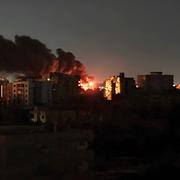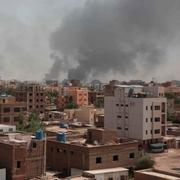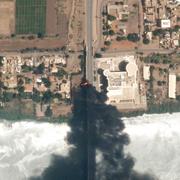Analysis: The conflict in Sudan is more than an internal struggle
The fighting between Sudan's regular army and the paramilitary RSF risks spilling over into other countries. At the same time, the chaos is partly fueled by others, writes the Washington Post's Ishaan Tharoor in an analysis.
As an example, he mentions how army chief Abdel Fattah al-Burhan was supported financially by Saudi Arabia and the United Arab Emirates. The RSF, in turn, has "obvious ties" to the Russian paramilitary Wagner Group. The country is important to Russia, which wants to establish a naval base on the coast of Sudan.
In an explanatory text, Bloomberg writes that the violence in Sudan is a democratic setback for Africa in general, and that it follows coups in Burkina Faso and Mali. After Sudan became independent in the 1950s, there have been "countless rebellions" in the country.
According to the newspaper, there is a risk that Sudan's neighboring countries - either directly or indirectly by providing support to proxy forces - will be drawn into conflict

SBild from Khartoum, April 16. Abdullah Moneim / AP
The EU's humanitarian chief in Sudan has been shot
The EU's head of humanitarian aid in Sudan, Belgian Wim Fransen, has been shot and is being treated in hospital, sources told the New York Times. It is unclear how serious the injuries are.
According to the sources, he has been missing since Sunday.
Fighting has raged since Saturday between the regular army and the paramilitary RSF. The parties have agreed on a truce for 24 hours starting at 6 p.m. Swedish time. At 6:15 p.m., however, there were reports of gunfire in the capital, Khartoum.

Image from Khartoum, April 16. Marwan Ali / AP
Reports of continued fighting in Sudan despite ceasefire
Although Sudan's army and the paramilitary RSF have agreed on a cease-fire as of 6 p.m. Swedish time, fighting still prevails, reports Al Jazeera.
According to the channel's broadcaster Hiba Morgan, there has been shooting around the presidential palace in Khartoum even after the ceasefire would have come into force. - It seems that both sides are determined to fight, she says.
She adds that the army claims to have cut off communication between RSF commanders and combatants on the ground, and that orders for a cease-fire may not have been received.
Earlier on Tuesday, Reuters reported that the parties had agreed to a 24-hour ceasefire.

Inga kommentarer:
Skicka en kommentar